Biography
Lopen Karma Phuntsho teaches Buddhism and Bhutan’s history, culture and religion. He was born and brought up in Bumthang, Bhutan. He completed his full monastic training before going to Oxford to pursue a DPhil. The first Bhutanese to obtain a PhD at Oxford and fellowship at Cambridge, he has worked at the University of Cambridge, CNRS, Paris, the University of Virginia and currently works as a web content creator for Tsadra Foundation.
He is the author of numerous books and articles including The History of Bhutan, which received Choice Outstanding Academic Title Award. Lopen Karma has also created and directed audio-visual productions and managed many digital documentation projects. He is also the founder of the Loden Foundation, a leading educational charity in Bhutan and the founder and spiritual director of Bodhitse Centre for Study and Contemplation. For his contribution to culture and human progress, he was awarded the Ramon Magsaysay Award, Asia’s premier prize and highest honour, in 2024.
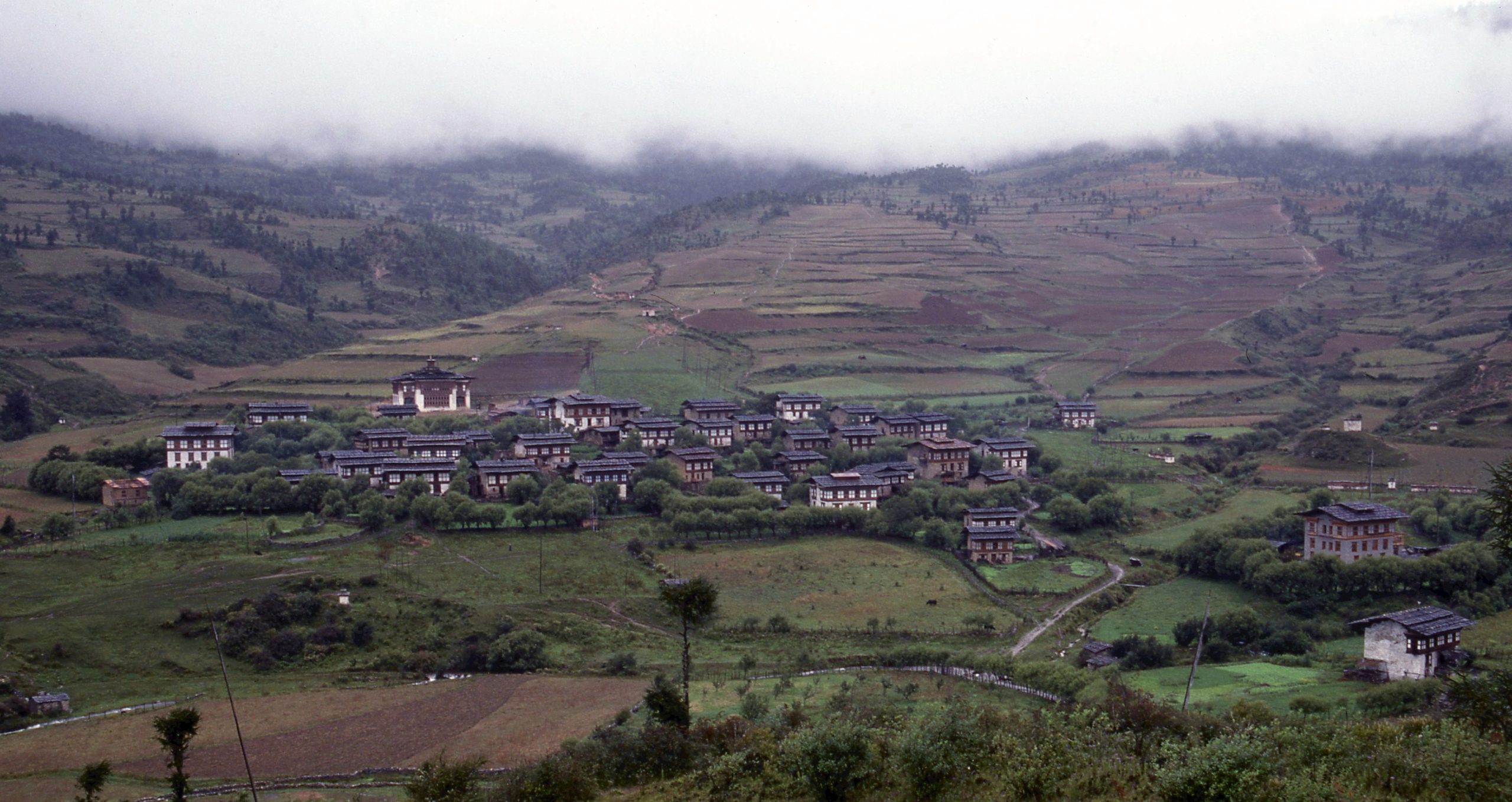
EARLY LIFE
Lopen Karma Phuntsho was born in Ura, one of the largest villages located in the Bumthang district in central Bhutan. Ura is located at an elevation of 3200m above sea level and the people of Ura combined agricultural and dairy farming. Due to the harsh climate, they often travelled to and owned land in neighbouring districts, which are warmer and more fertile. Also, the ancient highway passed through the village giving people of Ura additional exposure, and the village community was large enough to provide internal social support and solidarity. Due to these geographic and social circumstances, Ura was in the past well known for being a culturally and intellectually sophisticated community although locals give credit to the water and other natural elements of a hidden valley blessed by Padmasambhava, the saint who brought Buddhism to Bhutan.

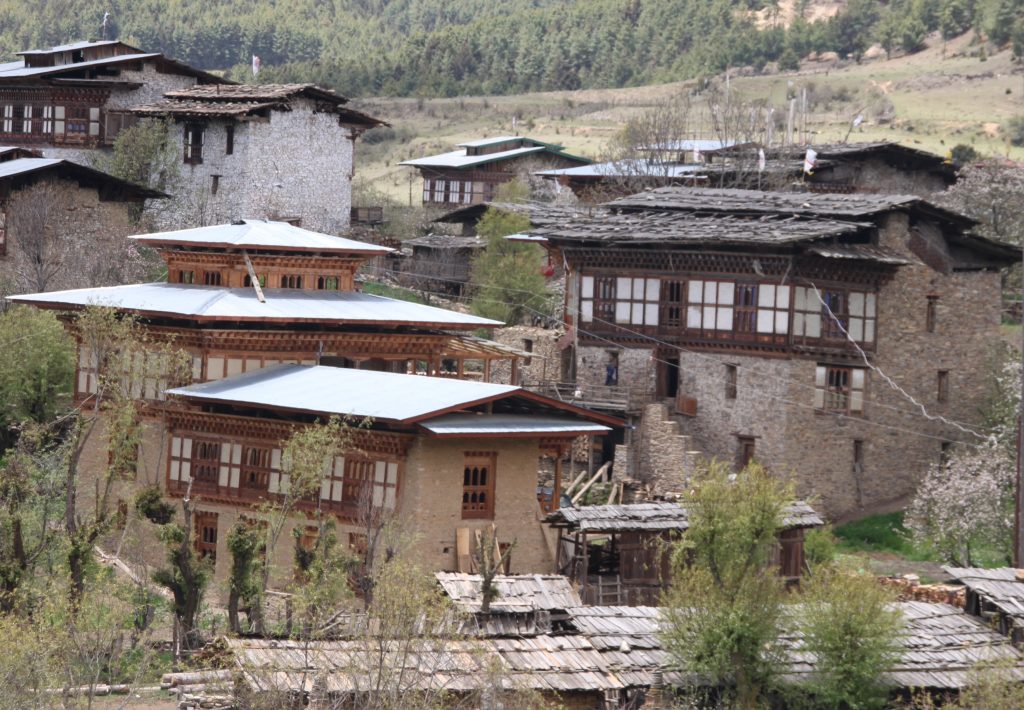
Karma’s family home is known as Tothchukpa house and his mother, following Bhutan’s matrilineal tradition, inherited the house from her mother. Some of his ancestors were traders who would travel on business trips to Tibet and India. His maternal grandfather and great great grandfather were scions of Gaden Lam family which traces its origin to Phajo Drukgom Zhigpo, the priest who brought Drukpa Kagyu tradition of Tibetan Buddhism to western Bhutan. The Gaden religious establishment is said to have been founded by Wangchuk, son of Phajo in the 13th century. Karma learnt basic Chokey alphabets and prayers from his father, who is from the Tsakaling Choje, a religious family claiming descent from Bhutan’s foremost spiritual saint Pema Lingpa and Tarshongchukpa house of Ura.
His father was recognised as an incarnation of a religious figure and thus received some basic education although he did not pursue a religious career. However, his father’s ability to read and write and the zest for learning had a significant influence on Karma and his siblings. All of them were sent to school although many children of his age group at that time did not receive the same degree of parental support of education.
EDUCATION
Karma attended Ura Primary School, which is only a short distance from his home. He studied in his village school until Class III. He reminisces being a teacher’s pet throughout primary school and recollects peeing on a teacher’s shoulder as the teacher carried him. He would lead the school prayer sessions and was also active in cultural activities. Because the school did not have Class IV and he was too small to travel, his parents begged the headmaster to keep him in Ura. Thus, he repeated in the same class.
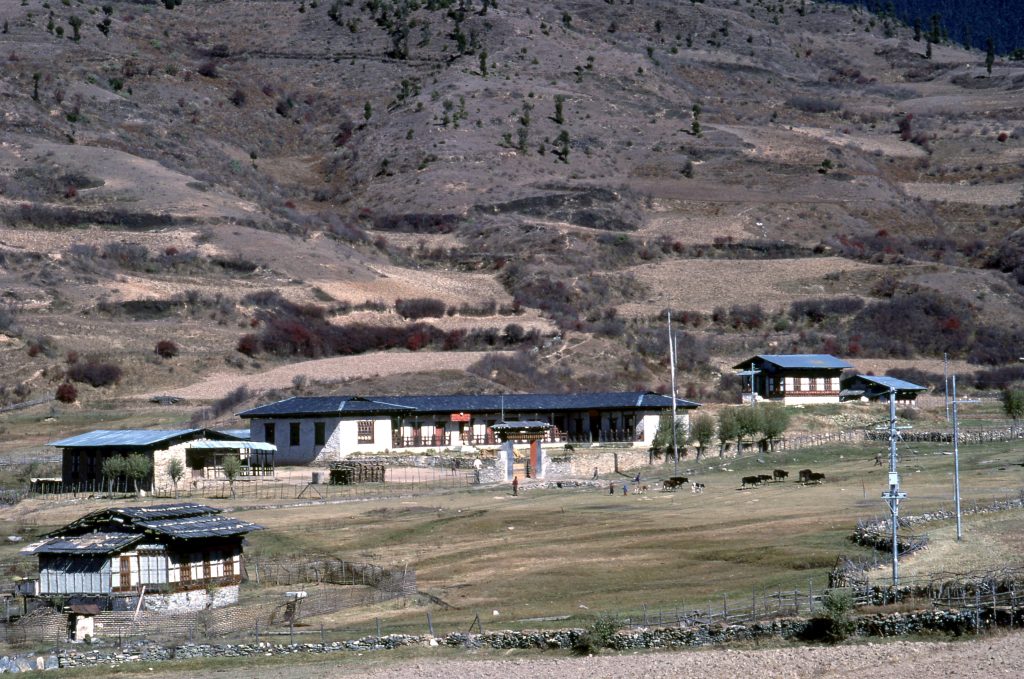

The following year, he travelled to Jakar School, which is a day’s walk, with a few friends. The headmaster at the new school mistakenly put Karma and his mates again in Class III. Karma today humorously claims that he is perhaps the only person who studied in Class III for three years and received first prizes thrice. During six years in Jakar school, he fondly remembers spending time as a cook for his Indian teachers, working as a health assistant, loving biology with a strong desire to become a medical doctor, and running the school bookstore, cultural clubs, and annual fetes although he was often bullied by others due to his small stature. His teachers were amused when he stuck extra wooden heels to his shoes to make up for his height among mates who were older. Karma spent most of his school winter breaks helping the family cow-herder in the neighbouring district of Lhuntse.
In 1986, he came to Thimphu and had a short spell at Yangchenphug Higher Secondary School before leaving school to become a monk and study Buddhism at Chagri Monastery. When asked about why he became a monk suddenly at the age of 16, Karma gives several reasons for his decision including rampant bullying, falling out with a teacher, and opportunity to pursue an unusual educational track. Not satisfied with Buddhist education he received in Chagri, he went to south India to continue his studies spending a year at Sera Monastery then ten years at the Ngagyur Nyingma Institute. Since 1994, he has taught Buddhism and related subjects and has served a lecturer at the Ngagyur Nyingma Institute in Bylakuppe.
In 1997, partly he says because young Bhutanese educated in English looked down on monks even though they were very learned, he pursued a postgraduate degree in the West so as to gain a position of authority to talk about both traditional and modern systems of education. He joined Balliol College Oxford and read for an M.St. in Sanskrit and Classical Indian Religions under Richard Gombrich and Michael Aris, with additional supervision by David Seyfort Ruegg. His first academic article in English is Two Ways of Learning in Bhutan.
In 2003, he received a D.Phil. in Buddhist Studies from Oxford University. He worked as a post-doctoral researcher in CNRS, Paris and as a research associate in the Department of Social Anthropology, Cambridge University. He was also the Spalding Fellow in Comparative Religions at Clare Hall and ran The Historical Study and Documentation of the Pad Gling Traditions in Bhutan project subsequently he spent years creating a digital archive of rare Bhutanese manuscripts. Dr. Phuntsho is the first Bhutanese to receive a D.Phil. from Oxford and the first Bhutanese to become an Oxbridge Fellow. In Bhutan he has founded the Loden Foundation, a charity to promote education and entrepreneurship in Bhutan as well as the Shejun Agency for Bhutan’s Cultural Documentation and Research, which later was merged with the Loden Foundation.
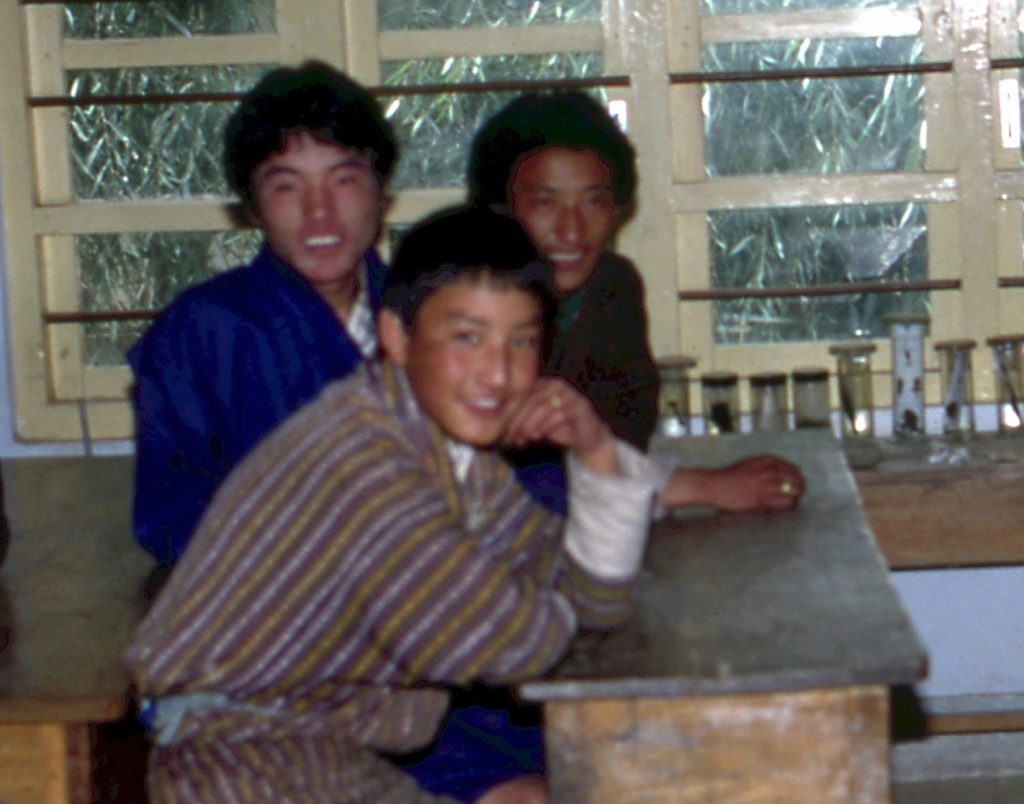
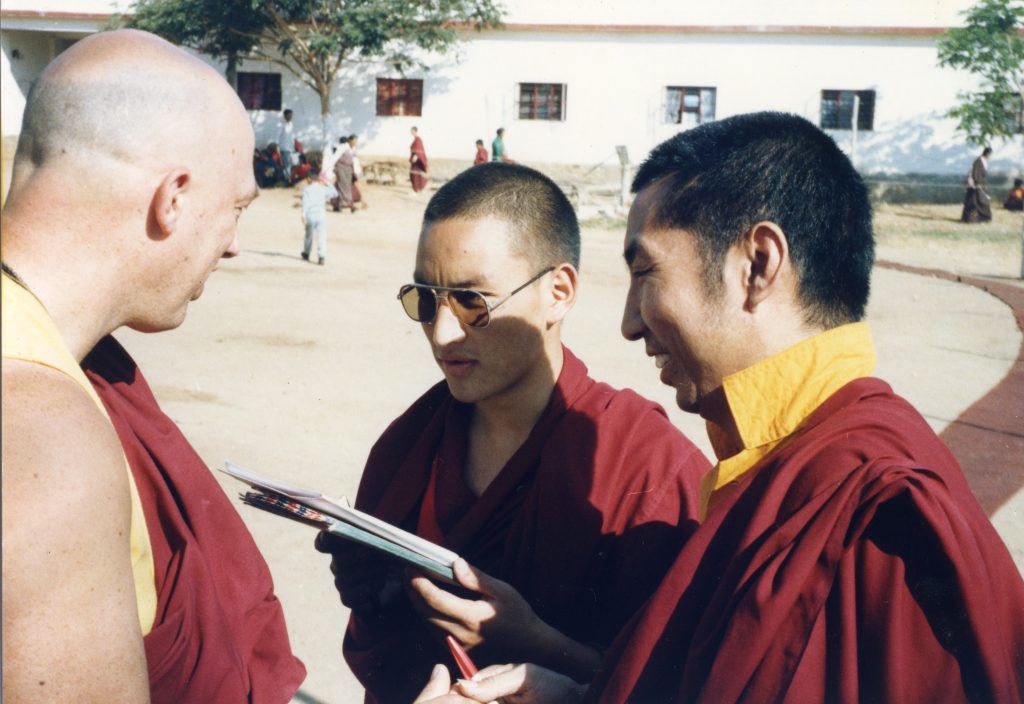
WORK
Lopen Karma started teaching junior colleagues at Ngagyur Nyingma Institute in 1990. From 1992, he also regularly served as English interpreter for His Holiness Penor Rinpoche and also intermittently served as an assistant teacher for his Ngondro meditation instructions. When he was in the sixth year of his study at Ngagyur Nyingma Institute, he was sent to head the Ngagyur Shugseb Nunnery. This, he would later recollect, was a very sad but one of the most rewarding experiences in his spiritual development, particularly in understanding the opposite gender. After leading Shugseb for a year and half, he returned to Ngagyur Nyingma Institute where he was an active member of the Ngagyur Rigzod editorial committee, and wrote several short articles on Buddhist topics in Tibetan. In 1997, he finished his monastic studies and was appointed as a lecturer at Ngagyur Nyingma Institute, where he took up intensive teaching, often lecturing six to eight hours a day. During his time in South India, he also attended interfaith dialogues, frequented Maha Bodhi Society in Bengaluru for Theravada teachings and Zen retreat, and also worked with Dalit communities in Karnataka. In 1997, he published his debut book Steps to Reasoning: A Treatise on Logic and Epistemology, which has since been reprinted many times and used as a text book and reference in many Tibetan centres in India and Tibet.
On his way to Oxford in 1997, he went with his close colleague Khenpo Tshewang Sonam to Oslo as research informants for Professor Federick Barth, a renowned anthropologist. While at Oxford, he continued attending interfaith meetings and other gatherings, often led by Michael Aris, who represented his wife Aung San Suu Kyi at various meetings. From 1999, he taught courses on Buddhism for the Faculty of Theology and Religion and also performed religious services.
In 1999, with an intention to help children from economically deprived families to avail education, he founded The Loden Education Trust with some close friends as fellow trustees. He raised funds in the UK, including the initial donation of £50 from his friend Robert Miles, the head porter of Balliol College, to fund students such as Tenzin Pelmo, who is today a history teacher. While he raised the funds in the UK, his erstwhile teacher Kunzang Choden, who was based in Bhutan, used to distribute the funds to deserving beneficiaries. Dame Joanna Lumley inaugurated the first fundraising event and King Jigme Khesar Namgyel Wangchuck of Bhutan, then the Crown Prince, graced the second event.
In 2003, he completed his studies and became a postdoc researcher at CNRS, Paris, during which he worked on turning his thesis into a book. His first book in English, Mipham’s Dialectics and the Debates on Emptiness: To be, not to be or neither, was published by Routledge in 2005. In 2004, he joined the Department of Social Anthropology, Cambridge University as a research associate to study Tibetan manuscripts in Cambridge University Library, Oxford’s Bodleian Library and the British Library. The work on Tibetan manuscripts in these libraries inspired him to study Bhutan’s archival collections and the nationwide digitisation programme, which he led since 2004. In 2005 while continuing as research associate, he was awarded the stipendiary Spalding Fellow in Comparative Religion at Clare Hall. Having received a grant to undertake the historical study and documentation of the Pema Lingpa tradition in Bhutan, he continued at Cambridge University until 2012 although much of this time, he would travel across Bhutan to digitise manuscripts and compile the works of Pema Lingpa. During this period, he also expanded the works of Loden in the UK with the help of mainly his friend Yeone Moser, and also established an office and hired first staff for the Loden Foundation in Bhutan. In 2008, together with Anne Tardy and Gerard Tardy, he initiated the Loden Entrepreneurship Programme to promote social entrepreneurship and also launched Loden’s preschool programme and scholarships for tertiary education.
After returning to live in Bhutan in 2013, he launched his book The History of Bhutan, which he wrote on the sidelines of his work at Cambridge and was published by Penguin-Random House. The book got listed as the 2015 Choice Outstanding Academic Title. He also established Shejun Agency for Bhutan Cultural Documentation and Research and initiated a nationwide documentation of oral and intangible cultures across Bhutan in collaboration with the University of Virginia with funding from Arcadia. From 2013-2018, in addition to supervising ethnographic documentation in all twenty districts of Bhutan amounting to some 3000 hours of recordings and 100,000 photos, he created a Bhutanese cultural inventory and typology, wrote over 250 essays on Bhutanese cultures, and produced many interviews, films and books on culture and contemporary Bhutan. The Shejun Agency was later merged with Loden according to the wishes of its employees.
Between 2016 and 2019, he was also engaged in writing the biography of Guru Rinpoche in partnership with three other Bhutanese authors resulting in the book entitled The Life and Deeds of Padmasambhava: A Bhutanese Chronicle. He also led the project to design the Dzongkha Standard Testing System for the Dzongkha Development Commission. In 2019 and 2020, he served as the deputy-chair of the task force team appointed by the Royal Government of Bhutan for developing the 21st Century Economic Roadmap for Bhutan. From mid-2020, at the height of Covid pandemic, he joined Tsadra Foundation as a writer-in-digital residence to work on the Buddha-Nature project. He currently writes and creates content for the Bochitta project of the Tsadra Foundation.
Since 2000, Lopen Karma Phuntsho has regularly returned to his village in Bumthang to help the villagers organise the Ura Yakchoe festival, document the festival procedures in the form of a written statutes, and produce films about Ura’s festivals. He served the Ura Solidarity Association as a Secretary General for over ten years. Since living in Thimphu, he has put in his resources to build the Bodhitse Centre for Study and Contemplation, where he has compiled a rich library of Buddhist books and regularly hosts spiritual and cultural events.
For his contribution to cultural research and human development, he was awarded the Ramon Magsaysay Award, Asia’s premier prize and highest honour, making him the first Bhutanese to receive the award.
CURRENT POSITION
- Writer-in-Digital Residence, Tsadra Foundation
- Spiritual Director, Bodhitse Centre for Study and Contemplation
- Founder and Trustee, The Loden Foundation
- Trustee, Ogyen Choling Foundation
- Board Member, International Association of Tibetan Studies
- Chairperson, Drukrig Network of Bhutan Scholars
- Editorial Committee Member, The Treasury of Lives
- Editor, The Druk Journal
- Member, Advisory Board of Mountain Hazelnut Ventures
- Member, Ura Yakchoe Committee, Ura Solidarity Association
PAST POSITION
- 2020 – 2021 Deputy Chair, National Taskforce for Bhutan’s 21st Century Economic Roadmap
- 2020 – 2022 Advisor, Bhutan Education and Technology Park
- 2015 – 2019 Member, University Council, Royal University of Bhutan
- 2014 – 2022 Secretary General, Ura Solidarity Association
- 2013 – 2018 Research Consultant, University of Virginia
- 2013 – 2014 Member, Royal Education Council
- 2013 – 2019 Research Associate, SOAS, London
- 2013 – 2017 Editorial Board Member, Himalaya
- 2011 – 2014 Advisory Editor, Bhutan Journal of Research and Development
- 2011 – 2014 Editor, Journal of Oxford Centre for Buddhist Studies
- 2005 – 2006 Spalding Fellow, Clare Hall, Cambridge
- 2004 – 2012 Research Associate, University of Cambridge
- 2003 – 2005 Postdoc Researcher, EPHE and CNRS, Paris
- 2000 – 2001 Fellow, Department of Sanskrit and Indian Studies, Harvard University
- 1994 – 1995 Head, Shugseb Nunnery, Dharamsala
- 1993 – 1997 Assitant Lecturer and Lecturer, Ngagyur Nyingma Institute
INTERESTS / HOBBIES
Lopen Karma Phuntsho is an ecumenical follower of contemplative traditions and a regular speaker on Buddhist meditation, and social engagement. He has spiritual training and interests in all Indo-Tibetan Buddhist traditions, Zen and Vipassana, and other spiritual and wisdom traditions. He also loves gardening and outdoor activities, music and art.
LANGUAGES
Lopen Karma Phuntsho’s mother tongue is Bumthangkha and he speaks Khengkha, Kurtoep, Chocha Ngacha and Tshang fluently. He has learnt to read Pali and Sanskrit, speak and read Nepali and Hindi, and also studied basic French and Chinese.
However, he mostly writes and speaks in English, Dzongkha and Tibetan.
CV
See his Curriculum Vitae here.